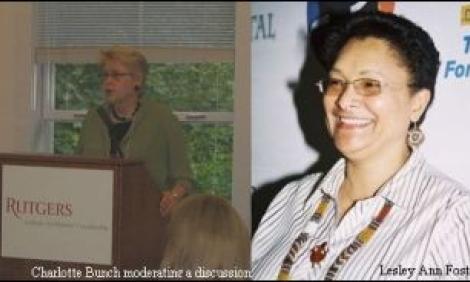In depth
Violence against Women and Information Communication Technologies: Philippines Country Report: The nexus of violence against women (VAW) and information, communication and technology (ICT)
By Jessica Umanos Soto
Jessica Umanos Sotos explores why specific law is needed in the Philippines to prosecute perpetrators of violence against women through the use of ICTs or cyberspace. She argues that national ICT institutions and private companies’ policies cannot remain blind to the violations to women’s rights perpetuated via ICTs in the context of the violation of privacy rights through the illicit production…
In depth
TIC : Femmes, logiciels libres, copyrights, …les oubliés du législateur et du décideur mauritaniens
By Fatma Mint Elkory Oumrane
Les logiciels libres sont une vraie solution aux problèmes de fracture numérique qu’engendre le sous -développement. En effet, il est désormais indéniable qu’ils ont, avec l’implication des femmes et leur prise en compte comme actrices incontournables, une part importante à jouer dans la création d’un environnement favorable à un développement équitable et durable.
In depth
Les droits d’auteur et les brevets limitent–ils l’accès aux connaissances et au traitement du VIH/SIDA en Afrique?
By Sylvie Nyombo
Le dernier rapport de 2008 de l’ONUSIDA confirme que l’Afrique subsaharienne reste la région du monde la plus sérieusement affectée par le VIH, et représente les deux tiers (671%) du total des personnes vivant avec le VIH et les trois quarts (75%) des décès dus au SIDA en 2007. Environ 1,9 million de personnes ont été nouvellement infectées par le VIH en Afrique subsaharienne.
In depth
ICTs: Women, free software, copyrights,… forgotten by Mauritanian legislators and decision-makers
By Fatma Mint Elkory Oumrane
Fatma Mint Elkory Oumrane takes a look at the progress Mauritania is making in encouraging open access to materials, its copyright regime and how these impact on women. She examines the role of women as ICT graduates and looks at how the government is helping overcome the various digital divides - and the large amount of work that remains to be done.
In depth
Copyright? Copyleft? Why does it matter? An interview with Heather Ford
By Mavic Cabrera-Balleza
GenderIt writer Mavic Cabrera-Balleza interviewed Heather Ford, Founder of the African Commons Project, a South African NGO with the goal of mobilizing communities through active participation in collaborative technology. Ford has worked in the fields of internet policy, law and management in South Africa, the United Kingdom and the United States. She sheds light on some of these issues.
In depth
Access to Knowledge in Emergency situations: Looking at the situation in Jordan and in the Democratic Republic of Congo
By Sonia Randhawa
Sonia Randhawa interviewed with Lulu Mitshabu and Daoud Kuttab. Lulu Mitshabu is the Africa Programs Coordinator at Caritas Australia. A Congolese woman, she travels through Africa regularly and is responsible for their Congolese programme. Daoud Kuttab is president of AMARC Middle East and North Africa, and responsible for setting up Jordan's first community radio. He has recently been working…
In depth
Challenges of communal copyright: Traditional and indigenous knowledge
By Sonia Randhawa
Copyright and patents legislation has spread rapidly over the past century. This has a particular impact on indigenous women and the holders of traditional knowledge, as copyright ignores the possibility that knowledge can be held communally and has definitions of knowledge that exclude information held in a spiritual context. In this article, GenderIT writer Sonia Randhawa examines how women's…
In depth
University women struggle for knowledge access in Africa
By Kathleen Diga
The future female leaders of Africa are up against major barriers to knowledge access, which could mean lost opportunities in university learning and teaching the state-of-the-art research most necessary for academic success. Online academic journals, and university textbooks are a few of the important resources that are part of this access to knowledge, which is pertinent particularly at the…
In depth
Do copyrights and patents limit access to HIV/AIDS knowledge and treatment in Africa?
By Sylvie Nyombo
The UNAIDS 2008 report confirms that Sub-Saharan Africa continues to be the region most seriously affected by AIDS in the world. As part of the response to this pandemic, access to information and knowledge on HIV/AIDS is vital, as disease prevention depends heavily on information. In a world where there is a price to pay for access to knowledge, to what extent do patents and copyrights limit…
In depth
Finding a difficult balance: Human rights, law enforcement and cyber violence against women
By Mavic Cabrera-Balleza
GenderIT writer Mavic Cabrera-Balleza probed on new analytical frameworks of violence against women taking into account cyber violence and the challenges and dilemmas women activists confront as they struggle to address this relatively new dimension of gender injustice. She spoke with two women activists who are at the forefront of advocacy on violence against women at the national and…










